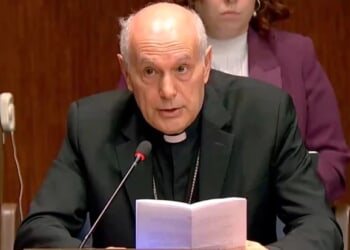One of the great intrigues in international relations is the tense relationship between Presidents Donald Trump and Volodymyr Zelensky. From the “perfect phone call” in the July 2019 to the sharp exchange in the Oval Office last February, Trump and Zelensky have long had a contentious relationship with real world consequences, including interruptions in the flow of essential U.S. weapons to Ukraine.
More recent encounters with the bravery and wartime ingenuity of the Ukrainian people, have resulted in Trump’s appreciation of the heroism of Ukrainians.
Ukrainian officials, Zelensky’s advisors, and Ukraine’s President himself, have searched for a way to build a positive relationship with the U.S. President without success. Zelensky’s predecessor (and bete noire) Petro Poroshenko, successfully engaged Trump through a transactional approach by agreeing to import U.S. coal. Zelensky’s more recent efforts to improve relations have included Ukraine’s initiative for the much-vaunted minerals agreement with the U.S. and efforts to encourage U.S. investments in Ukraine’s innovative defense sector. Yet neither initiative has significantly moved the needle in relations between the two men.
What is striking in the tense relationship between the presidents is the striking similarity in the personalities and governing styles of both men. Think about it. Both are tough men, shaped by their early experiences of living or working in gritty urban outposts (Trump in his family real estate business in Queens and Zelensky in industrial Kryvyi Rih). Both won decisive victories by running against and promising to upend an out of touch and corrupt political establishment.
Both are Presidents at the peak of their powers, who have commanded a loyal legislative majority that pliantly advances their agenda. Both appoint key officials more on the basis of loyalty than demonstrated competence and experience. Both hold public meetings with their ministers/cabinet officers that are feasts of happy talk. Both have won over, cowed, or coopted many of their country’s most powerful billionaires. Both are temperamental and love to tangle publicly with critics in the press and civil society. And both rarely miss an opportunity to attack their immediate predecessors, (Trump-Biden and Obama, Zelensky-Petro Poroshenko) whom both accuse of criminality.
The parallels don’t end there. Both presidents have implemented major increases in military spending. And each has put in place a team of super-loyalists to ride herd over a justice system they scorn. Both men are former TV celebrities who adore public approval and project an image of supreme authority, brooking no compromise with opponents. In public encounters with world leaders, each conveys confidence and toughness; and while they can charm, they are often hard-headedly abrasive.
Donald Trump may not be aware of these many striking similarities between his own self-confident “kick-ass” style and that of the Ukrainian counterpart. Nor may he be aware that Trump’s 2016 campaign strategy influenced Zelensky’s successful own anti-establishment campaign of 2019.
But the remarkable similarities between the personalities and public personae of both are more than a mere curiosity, they also likely hold the key to their tense relationship. Their tough personalities and their refusal to compromise are the real reason why the two clash.
As significantly, their personal political styles have domestic political benefits. A strong Trump asserting the U.S.’s dominant role with world leaders plays well with his MAGA base, similar displays of strength appeal to Zelensky’s Ukrainian electorate, which expects and admires a tough leader for a nation at war. This dynamic is one reason why —unlike Britiain’s Keir Starmer, France’s Emanuel Macron, and Germany’s Friedrich Merz — Zelensky finds it difficult to be deferential in encounters with the U.S. President. Indeed, while Zelensky’s domestic popularity had eroded after three years of war, his Oval Office encounter with Trump led to a huge — if temporary — spike in his popularity.
While Trump and Zelensky’s tensions are vexing and — for a Ukraine at war — even dangerous, there are work-arounds. These could include engaging a broader array of interlocutors in outreach to Republican leaders, MAGA constituencies, and Trump himself. Instead, Zelensky has centralized U.S. diplomacy, keeping a tight lid on direct relationships with Washington.
Zelensky apart, high-level diplomacy has become the near-exclusive preserve of his closest confidante, Andriy Yermak, who plays the role of Susie Wiles, Steve Witkoff, and Marco Rubio for the Ukrainian President and who, according to U.S. reporting, is reviled by the Trump national security universe.
Importantly, Trump’s antipathy to Zelensky and his inner circle doesn’t extend to Ukraine and the Ukrainian people. To be sure, Trump’s long held stereotypical views of Ukraine were shaped by his own and his inner circles encounters with Ukrainians. These views included a range of tropes that focused on “rampant” corruption and an understanding of Ukraine’s national identity that derives from Soviet era stereotypes that obscured the deep differences that exist between Ukrainians and Russians.
More recent encounters with the bravery and wartime ingenuity of the Ukrainian people, have resulted in Trump’s appreciation of the heroism of Ukrainians, whom he praised as “very brave” on June 25th.
Several weeks ago during the NATO summit in the Hague at an encounter with an exiled Ukrainian journalist working for the BBC, Trump exhibited empathy and genuine sympathy for the woman’s very clear distress in the face of her nation’s suffering and the dangers faced by her soldier/husband, now on the frontlines. There followed Trump’s decision to continue arming Ukraine albeit in the future primarily with funds from European allies. Recent mass anti-corruption protests, led by Ukraine’s future generation of leaders, are another signal to the U.S. President that Ukrainians are a heroic and democratic people deserving of U.S. support and solidarity.
Amid Russia’s relentless new attacks on Ukrainian cities, Trump’s growing understanding and sympathy offers hope that whatever his personal tensions with Zelensky, they can be surmounted and the U.S. can continue to support Ukraine’s defense while increasing economic pressure on Putin through tougher sanctions. Better yet, it would be great if the President saw something of himself in his Ukrainian counterpart.
READ MORE:
While Trump Arms Ukraine, US Firms Arm Russia
Russia’s Aerial Assault on Ukraine
Adrian Karatnycky is a Senior Fellow at the Atlantic Council and author of Battleground Ukraine: From Independence to the War with Russia (Yale).


![Former Bravo Star Charged After Violent Assault Using a Rock-Filled Sock in Tennessee Walmart [WATCH]](https://www.right2024.com/wp-content/uploads/2025/07/Former-Bravo-Star-Charged-After-Violent-Assault-Using-a-Rock-Filled-350x250.jpg)



![NYC Man Snatches Child Off The Sidewalk, Parents Chase Him Down [WATCH]](https://www.right2024.com/wp-content/uploads/2025/07/NYC-Man-Snatches-Child-Off-The-Sidewalk-Parents-Chase-Him-350x250.jpg)
![Karoline Leavitt Levels CNN's Kaitlan Collins and Other Legacy Media Reporters [WATCH]](https://www.right2024.com/wp-content/uploads/2025/07/Karoline-Leavitt-Levels-CNNs-Kaitlan-Collins-and-Other-Legacy-Media-350x250.jpg)
![Man Arrested After Screaming at Senators During Big Beautiful Bill Debate [WATCH]](https://www.right2024.com/wp-content/uploads/2025/06/Man-Arrested-After-Screaming-at-Senators-During-Big-Beautiful-Bill-350x250.jpg)
![Leftists Lose Their Minds After Jason Kelce Celebrates Being an American [WATCH]](https://www.right2024.com/wp-content/uploads/2025/07/Leftists-Lose-Their-Minds-After-Jason-Kelce-Celebrates-Being-an-350x250.jpg)
![Illegal Alien Walked Free After Decapitating Woman, Abusing Corpse for Weeks [WATCH]](https://www.right2024.com/wp-content/uploads/2025/07/1753013138_Illegal-Alien-Walked-Free-After-Decapitating-Woman-Abusing-Corpse-for-350x250.jpg)





